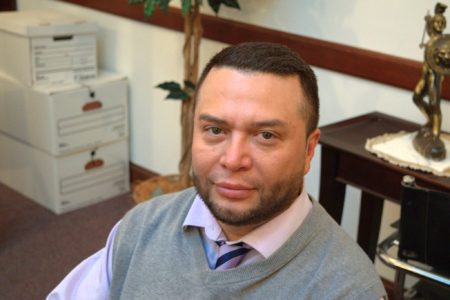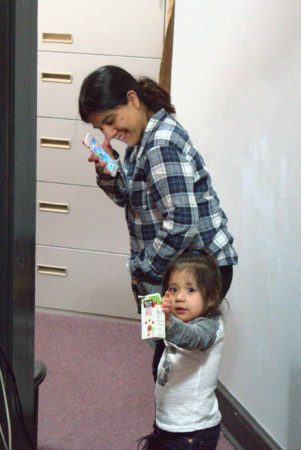What does Allison French, a social worker in Chicago’s Englewood neighborhood, think the most common intrapersonal crime in Chicago is?
“Domestic violence,” she answered, with no hesitation.
Headlines about Chicago’s violence often emphasize body counts, victims, and speculation about the perpetrators and motives. These stories give readers a strong visual connection to the crimes.
One in four women will be domestically abused within their lifetimes, according to the National Coalition Against Domestic Violence, and domestic violence claims 1,200 lives a year in the United States. This issue is often viewed by victims and bystanders as a private matter, but at victim-centric organizations, the focus is on giving victims a voice in the public sphere.
When French receives a case involving a parent who has been convicted or accused of domestic violence, she examines background checks and police reports looking for repeat offenders. Often the offender is required to complete a course of domestic violence counseling at a “community provider,” a state-registered service.
“When a case comes into our office, we try and address every single issue relating to the children’s wellbeing, even if it is not the specific reason it became our case,” French explained.
Community providers are key in restoring a stable home life for thousands of Chicago families. Avance Counseling is one such organization.
Located on a street corner in Lincoln Square between doctors’ offices and acupuncture clinics, Avance is where domestic violence offenders begin the process of facing their actions. Inside, it looks like any doctor’s office, full of stacks of paperwork, file cabinets, and people bustling in and out. But its practice is re-education.
Dr. Jorge Argueta is the director at Avance and has worked with domestic violence offenders since 1998. His clients are typically males who have committed some form of physical violence against an intimate partner, as well as possible offenses in one or more of the other three categories of domestic violence defined by Avance: sexual, emotional, and economic.
 phjudge | Mosaic Magazine
phjudge | Mosaic MagazineDr. Jorge Argueta has been working in domestic violence since 1998 and works with offender in a less than traditional way.
Argueta is only the second director of the northside counseling center and is well-versed in the behavior and mentality of the offenders that walk through his doors. His clients can come voluntarily, but the majority come from social services, or through court-mandated probation. Clients pay a service fee, which adjusts to reflect income, while the remaining funding comes from Cook County. After a preliminary intake interview to determine the main offense, the majority of clients are enrolled in the Partner Abuse Intervention Program (PAIP).
PAIP is a 24 to 26 week course that, as Argueta explained, “focuses on psycho-educating domestic violence offenders with a priority on accountability, and victim safety.” Offenders are required to complete the course if it has been mandated by the government, and many undergo counseling as part of their probation to regain custody of their children. The counseling takes place in weekly small group meetings with pre-approved curricula that differ from center to center, but it generally focuses less on the traditional bookwork approach and more on a feminist perspective of equality.
This approach shuns the common justification for domestic violence: that offenders are a product of their environment.
“We evaluate the clients’ progress when they don’t use objectifications, don’t have misogynistic attitudes, when they understand women’s emotions in terms of accepting and validating their partner’s feelings,” Argueta explains. This is also one of the goals of the PAIP program.
 phjudge | Mosaic Magazine
phjudge | Mosaic MagazineThe center helps people from all walks of life.
While emotions like anger, frustration, and anxiety are common, these offenders have reacted by using violence. Avance helps them understand that life brings obstacles that create emotions, but reacting to these emotions with violence is not their only option.
Offenders in the PAIP program must attend at least 23 meetings, take full ownership of their actions, and show remorse and willingness to change their behavior. Monthly progress reports are sent to probation officers and case workers to encourage growth from all sides. Once an offender leaves the program, counselors have the option to contact victims if they feel there are any remaining safety concerns.
Argueta hopes to expand the types of services Avance offers in the future, particularly in counseling for women. He feels there is a lack of clarity in cases with females when determining the victim and offender. Often he comes across female offenders who are actually victims acting in self defense.
There is limited research and curriculum focused on helping females as both victims and offenders at Avance. Argueta hopes that with future study and focus, women will receive tailored counseling treatment for domestic violence based on their perspective.
Avance is an education-focused organization. Much of what it teaches focuses on respect for beliefs, other people’s emotions, and the role each person plays in their family and community. This is what truly lies at the core of domestic violence issues: the abuser feels they have lost control of a situation and need to regain it through physical violence. Argueta believes one of the biggest changes Avance can make is in the offenders’ mindset.
“We teach them [domestic violence offenders] positive masculine attitudes, not those that involve power, control, violence, and male privilege,” he explained. “We need to teach them the concept of masculinity from a positive point of view.”



